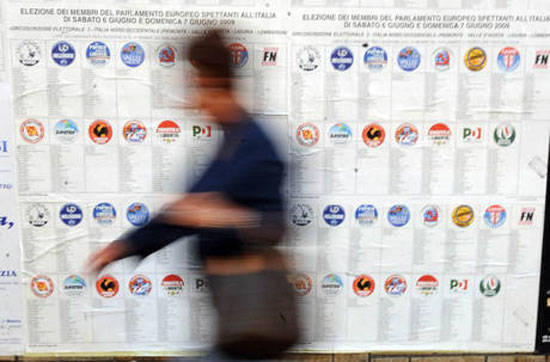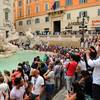Representatives to the European Parliament. Reading the Results
By Italian standards the final tally in all 64,328 polling stations, available early Monday afternoon, gave a fairly low turnout. Nevertheless, almost two-thirds (65.04%) of those with the right to vote did so—even though, indicating an unusual degree of alienation, voters turned in two million damaged and intentionally blank ballots, according to the Interior Ministry.
The most highly publicized of the intentionally damaged ballots came when a Neapolitan middle-aged woman voter tore up her ballot in disgust. The reason: when 18-year-old Noemi Letizia, wearing black beachwear (Bermuda shorts and bodice top) showed up with a young man described as her manager-chauffeur and her parents, they were allowed to jump the queue of 100 would-be voters in a Neapolitan-area polling station. The polling station was shut down for ten minutes while Noemi voted for the first time and then air-kissed the attendants. From outside came shouts of “Shame, shame”—not, apparently, aimed at the young lady who has caused Berlusconi so much troublesome gossip, but at the polling officials who treated her like a celebrity and did not make her wait her turn in line.
Initially Mr. Berlusconi had spoken optimistically of cornering 40% of the vote, a figure he raised in final days to 45%. This morning’s Il Giornale, whose proprietor is Berlusconi’s brother Paolo, reported triumphantly that the PdL share of the vote was “almost 39%.” In point of fact, the party won under 35.3%, for 29 seats in the EU Parliament at Strasbourg. Only a year ago in national general elections the PdL support was of 38.4%.
This 3% drop in consensus has several important implications. The most obvious is that the image of the Premier himself (and not, as his supporters claim, of the Italian nation or state), despite the massive media means at his disposal, has been damaged. If anything, public distaste for his flirting with young playmates like Ms. Letizia is the least of it; many here, women as well as men, see this as yet another sign of financial success. “He owns a soccer team and hosts parties with gorgeous women—how can we not envy him a bit?” as one voter told me on the way to the polls Sunday. Another voter told me, “My restaurant owner likes him—he said that under the Prodi government he had to file tax forms.”
But that is not the whole story. One factor behind the slump in votes for the PdL is the lack of convincing reforms. Another is the economic crisis, which now has Italian families buying less food in the supermarkets. Some voters were shocked by the opening last week of the 101st legal action against Mr. Berlusconi, in this case concerning alleged abuse of military airplanes for personal use. Only two weeks ago British financial wheeler-dealer David Mills was convicted by a Milan court on charges of corruption on Berlusconi’s behalf.
For the record, the ailing, squabbling Partito Democratico hoved in at 26.13%. But as with the vote for Mr. Berlusconi’s vote, given the circumstances, perhaps this was not a bad showing.
The problem is that voters are turning away from “Mr. B.”, as he is being called here, in favor of openly protest parties—on the right, Umberto Bossi’s Northern League, which has bounced up to 10.2%, and, on the left, to former magistrate Antonio di Pietro’s Italia dei Valori, which almost doubled its vote to 8%.
This creates a curious scenario. The renewed vigor of the recalcitrant Bossi, who supports the Berlusconi party in the governing coalition, can only mean trouble ahead. Bossi will now demand more payback by way of those Federalist reforms certain to alienate Berlusconi’s other (and ambitious) supporter, Fini, whose party by tradition is staunchly nationalistic. To combat Bossi and reassure Fini, who has been cautiously taking his distance from Berlusconi, the Partito della Liberta’ may begin negotiating with another small party which it has most recently snubbed, but is waiting in the wings: Pier Ferdinando Casini’s Catholic-oriented Unione di Centro, which won almost 7% of the vote.
Those with a long memory of Italian politics may notice a familiar trend. Traditionally the Christian Democratic party of the Sixties and Seventies gained some 35% of the vote—one-third—and the Communist party, 25%, or one-fourth. Analysts like sociologist/historian Giorgio Galli pointed out that this apportioning, election after election, seemed to be physiological, the result of family voting tradition dating back generations which inhibited real change. In order to muster sufficient votes for governing coalitions, the Christian Democrats therefore had to ally themselves with partners with radically different agendas, at the expense of reforms. This long-term trend may still be at work, with the inevitable consequences of difficult shared governance.





































i-Italy
Facebook
Google+
This work may not be reproduced, in whole or in part, without prior written permission.
Questo lavoro non può essere riprodotto, in tutto o in parte, senza permesso scritto.